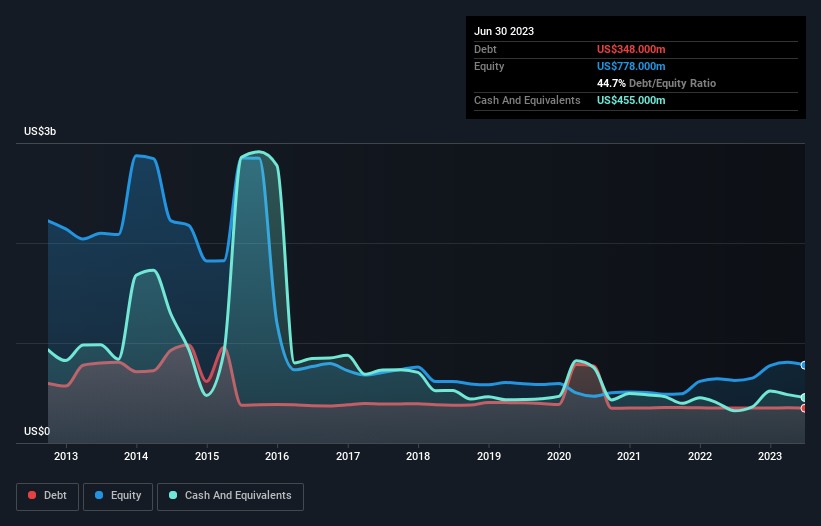Howard Marks put it nicely when he said that, rather than worrying about share price volatility, 'The possibility of permanent loss is the risk I worry about... and every practical investor I know worries about.' So it seems the smart money knows that debt - which is usually involved in bankruptcies - is a very important factor, when you assess how risky a company is. We can see that Visteon Corporation (NASDAQ:VC) does use debt in its business. But the more important question is: how much risk is that debt creating?
When Is Debt A Problem?
Debt and other liabilities become risky for a business when it cannot easily fulfill those obligations, either with free cash flow or by raising capital at an attractive price. Part and parcel of capitalism is the process of 'creative destruction' where failed businesses are mercilessly liquidated by their bankers. However, a more frequent (but still costly) occurrence is where a company must issue shares at bargain-basement prices, permanently diluting shareholders, just to shore up its balance sheet. By replacing dilution, though, debt can be an extremely good tool for businesses that need capital to invest in growth at high rates of return. The first thing to do when considering how much debt a business uses is to look at its cash and debt together.
See our latest analysis for Visteon
How Much Debt Does Visteon Carry?
As you can see below, Visteon had US$348.0m of debt, at June 2023, which is about the same as the year before. You can click the chart for greater detail. But on the other hand it also has US$455.0m in cash, leading to a US$107.0m net cash position.

A Look At Visteon's Liabilities
We can see from the most recent balance sheet that Visteon had liabilities of US$911.0m falling due within a year, and liabilities of US$632.0m due beyond that. Offsetting these obligations, it had cash of US$455.0m as well as receivables valued at US$785.0m due within 12 months. So it has liabilities totalling US$303.0m more than its cash and near-term receivables, combined.
Since publicly traded Visteon shares are worth a total of US$3.84b, it seems unlikely that this level of liabilities would be a major threat. However, we do think it is worth keeping an eye on its balance sheet strength, as it may change over time. While it does have liabilities worth noting, Visteon also has more cash than debt, so we're pretty confident it can manage its debt safely.
In addition to that, we're happy to report that Visteon has boosted its EBIT by 62%, thus reducing the spectre of future debt repayments. When analysing debt levels, the balance sheet is the obvious place to start. But ultimately the future profitability of the business will decide if Visteon can strengthen its balance sheet over time. So if you're focused on the future you can check out this free report showing analyst profit forecasts.
Finally, a company can only pay off debt with cold hard cash, not accounting profits. While Visteon has net cash on its balance sheet, it's still worth taking a look at its ability to convert earnings before interest and tax (EBIT) to free cash flow, to help us understand how quickly it is building (or eroding) that cash balance. In the last three years, Visteon's free cash flow amounted to 42% of its EBIT, less than we'd expect. That's not great, when it comes to paying down debt.
Summing Up
While it is always sensible to look at a company's total liabilities, it is very reassuring that Visteon has US$107.0m in net cash. And it impressed us with its EBIT growth of 62% over the last year. So is Visteon's debt a risk? It doesn't seem so to us. Of course, we wouldn't say no to the extra confidence that we'd gain if we knew that Visteon insiders have been buying shares: if you're on the same wavelength, you can find out if insiders are buying by clicking this link.
If, after all that, you're more interested in a fast growing company with a rock-solid balance sheet, then check out our list of net cash growth stocks without delay.
New: Manage All Your Stock Portfolios in One Place
We've created the ultimate portfolio companion for stock investors, and it's free.
• Connect an unlimited number of Portfolios and see your total in one currency
• Be alerted to new Warning Signs or Risks via email or mobile
• Track the Fair Value of your stocks
Have feedback on this article? Concerned about the content? Get in touch with us directly. Alternatively, email editorial-team (at) simplywallst.com.
This article by Simply Wall St is general in nature. We provide commentary based on historical data and analyst forecasts only using an unbiased methodology and our articles are not intended to be financial advice. It does not constitute a recommendation to buy or sell any stock, and does not take account of your objectives, or your financial situation. We aim to bring you long-term focused analysis driven by fundamental data. Note that our analysis may not factor in the latest price-sensitive company announcements or qualitative material. Simply Wall St has no position in any stocks mentioned.
About NasdaqGS:VC
Visteon
An automotive technology company, designs, manufactures, and sells automotive electronics and connected car solutions for vehicle manufacturers.
Flawless balance sheet and good value.
Similar Companies
Market Insights
Community Narratives




